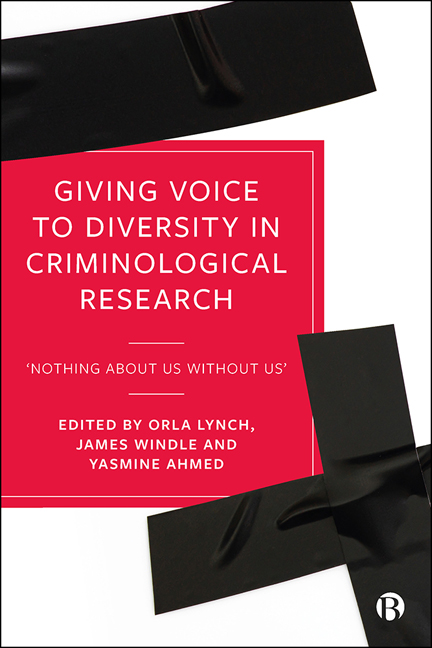1 - Introduction: ‘Nothing about Us without Us’, a History and Application for Criminology
Published online by Cambridge University Press: 13 May 2022
Summary
‘Nothing about us without us’ summarizes a burgeoning movement in criminology that is about giving voice to diverse perspectives and a way of doing research. Primarily it refers to the importance of an approach to criminology that is inclusive of those voices that have historically been hushed, marginalized, silenced, or ignored. It also refers to the need for researchers to work with state and grassroots practitioners, especially those who provide a conduit to peoples most impacted by social injustice and crime. This edited volume will explore the importance of diversity and inclusivity in criminological discourses and consider how researchers might bridge the gap between theory and lived experience and how the authenticity of the voices of those who have been silenced can be incorporated into a meaningful criminology. This introductory chapter will explore the conceptual history of ‘nothing about us without us’ before summarizing some of the key themes explored in this volume.
Criminal justice policies are formed through consultation and deliberation between moral entrepreneurs, politicians, and bureaucratic and economic actors (Monaghan, 2011; Windle, 2014, 2018). This, however, often occurs from positions of authority (see Becker, 1963; Stevens, 2020), and those most impacted by such policies are seldom included in decision-making processes (see Joyce & Lynch, 2017; Lynch & Argomaniz, 2017; Askew & Bone, 2019; Leonard & Windle, 2020).
The marginalization of these voices occurs both explicitly and implicitly. Marginalization may centre upon racism, classism, sexism, or other forms of discrimination, or may happen because a group is criminalized or stigmatized (see Lancaster et al, 2018, and McCullagh, O’Rouke et al, and McGarry et al's essays in this volume), including geographical stigmatization (see Windle and Leonard's essays in this volume). Policymakers and practitioners may also fail to include marginalized voices because they lack the time or resources to fully engage them in the process, or because policy/practice from above is how ‘it's always been done’. Furthermore, as Chapters 3 and 4 by McCullagh and O’Rouke and colleagues in this volume show, those in positions of power can use their authority, and the law, to silence those lobbying for change.
- Type
- Chapter
- Information
- Giving Voice to Diversity in Criminological Research‘Nothing about Us without Us’, pp. 3 - 16Publisher: Bristol University PressPrint publication year: 2021



